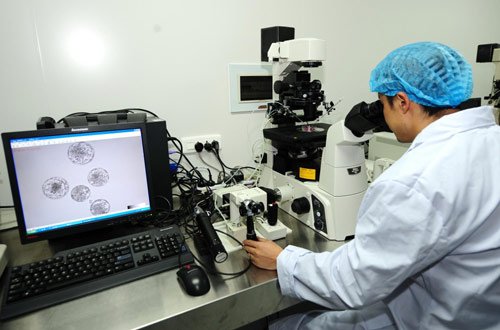Monkey offering hope for patients
|
|
|
A genetically engineered rhesus monkey (L) bred by Chinese scientists glows green when exposed to ultraviolet light (bottom), but it looks similar to an ordinary one in regular light (top). [Xinhua] |
Chinese scientists said on Friday they had bred the country's first genetically engineered rhesus monkey, a step that could speed up the development of cures for diseases ranging from cancer to Alzheimer's.
Scientists used green fluorescent protein (GFP), a substance that was originally isolated from a jellyfish and is now commonly used as a biotech marker, and implanted transgenic embryos in the uteri of surrogate mother monkeys, said Ji Weizhi, a researcher with the Kunming Institute of Zoology under the Chinese Academy of Sciences.
Two transgenic monkeys were born in June 2008, both carrying the GFP gene, said Ji, who heads the transgenic monkey research team.
|
|
|
A scientist does research on the genetically engineered rhesus monkey at a laboratory in Kunming, the capital of Southwest China's Yunnan province, Oct 28, 2010. [Xinhua] |
An animal tagged with GFP glows green when exposed to ultraviolet light, proving that a key gene sequence has been switched on.
One of the two transgenic monkeys is still alive, making China the third country to have genetically engineered a monkey, after the United States in 2001 and Japan last year.
The success could eventually lead to the cultivation of lab monkeys that can be infected with human diseases and studied, said Dr Niu Yuyu, a member of Ji's research team.
"The work is important because medical researchers have wanted an animal model that is closer to the human anatomy than rodents," said Dr Niu.
Mice and rats that are genetically engineered to have the symptoms of certain human diseases have been the mainstay of pre-clinical lab work and allowed scientists to test their theories before trying them out on human volunteers.
Monkey tests, however, are controversial internationally. Some experts have warned of the potential for an ethics storm, brewed by fears that technology used on primates could be used to create genetically engineered humans.
 0
0 



![A genetically engineered rhesus monkey (L) bred by Chinese scientists glows green when exposed to ultraviolet light (bottom), but it looks similar to an ordinary one in regular light (top). [Xinhua] A genetically engineered rhesus monkey (L) bred by Chinese scientists glows green when exposed to ultraviolet light (bottom), but it looks similar to an ordinary one in regular light (top). [Xinhua]](http://images.china.cn/attachement/jpg/site1007/20101030/0011111fa1560e35cca620.jpg)





Go to Forum >>0 Comments